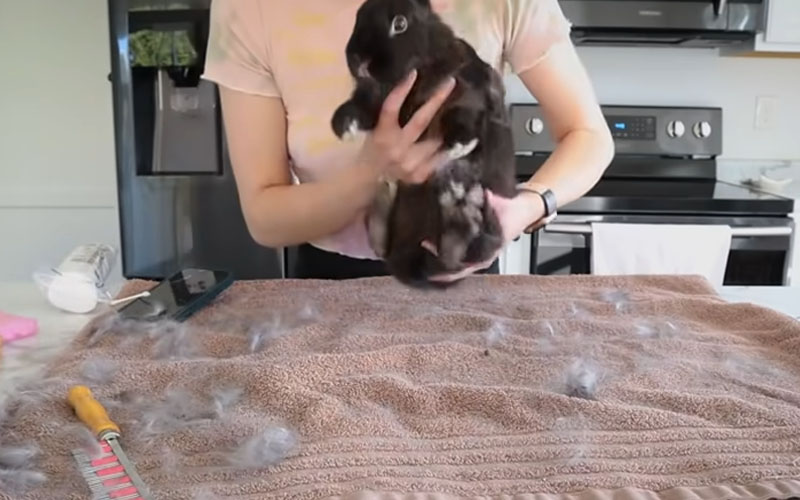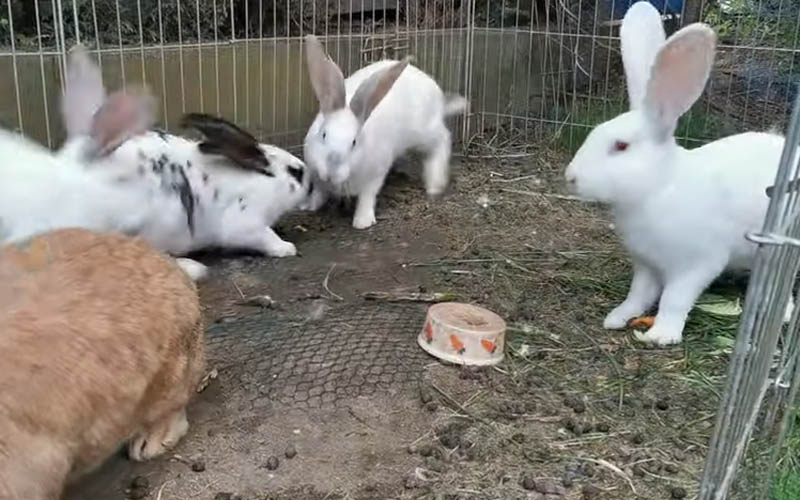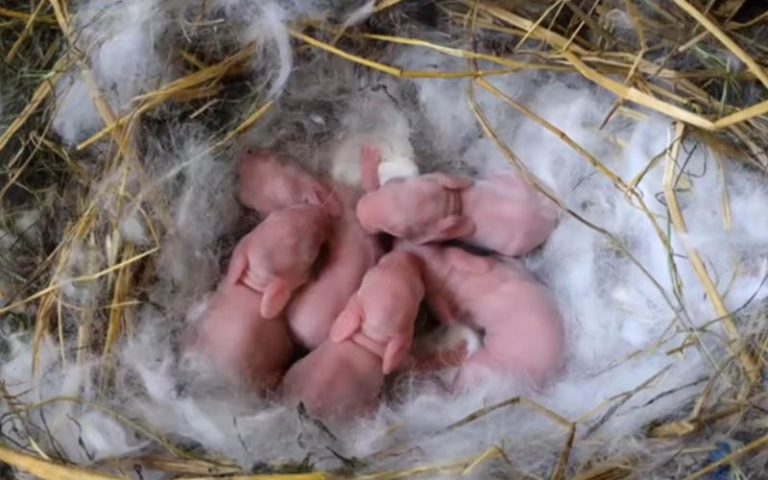Why Is My Rabbit Aggressive All of a Sudden? (7 Reasons)
Your rabbit may be suddenly aggressive due to stress, fear, or discomfort. Changes in their environment, health issues, or hormonal changes can trigger this behavior.
What Are the Signs of Rabbit Aggression?
Rabbits, generally known for their gentle nature, can exhibit signs of aggression in certain situations. It’s important to recognize these signs to ensure the well-being of both the rabbit and its owners. Here are some common signs of aggression in rabbits:
1. Body Language: Ears Back and Raised Tail
One of the primary indicators of rabbit aggression lies in their body language. Pay close attention to their ears; if they are pulled back tightly against the body, it may signal discomfort or irritation. Additionally, a raised tail, especially when accompanied by a tense body, can be a clear sign that your rabbit is feeling threatened or defensive.
2. Thumping Feet: A Warning Signal
Rabbits communicate through various means, and one unmistakable sign of distress or annoyance is foot thumping. If your rabbit starts thumping their hind legs on the ground, it’s their way of broadcasting a warning to other rabbits (or to you) that something is amiss. This behavior is often a prelude to more overt signs of aggression.
3. Growling and Grunting: Auditory Aggression
Just like other animals, rabbits can express aggression through vocalizations. If you hear your rabbit growling or grunting, it’s a clear indication that they are not happy with their current situation. These sounds are meant to establish boundaries and communicate discomfort or displeasure.
4. Charging or Lunging: Defensive Behavior
When a rabbit feels threatened, they may resort to charging or lunging as a means of defending themselves. This behavior can be accompanied by aggressive posturing, such as standing on their hind legs, and it’s a sure sign that your rabbit is feeling cornered or in danger.
5. Nipping and Biting: Last Resort Actions
While rabbits are generally not known for being bitters, aggressive behavior can escalate to nipping or biting in extreme circumstances. If your rabbit resorts to using their teeth, it’s a clear signal that they feel the need to defend themselves forcefully. Pay attention to the context in which this behavior occurs to identify potential triggers.
6. Territorial Marking: Claiming Ownership
Rabbits are territorial creatures, and aggression can arise when they feel their space is being invaded. If you notice your rabbit marking their territory more frequently, whether by spraying urine or leaving fecal pellets strategically, it may indicate a heightened sense of defensiveness.
7. Uncharacteristic Aggression: Changes in Behavior
Perhaps one of the subtler signs of aggression is a change in your rabbit’s overall behavior. If your typically friendly and sociable rabbit becomes increasingly withdrawn, irritable, or less inclined to interact, it could be a red flag. Keep an eye on any deviations from their habits and demeanor.
8. Stress-Related Aggression: Environmental Factors
Rabbits are sensitive to changes in their environment, and stress can trigger aggressive behavior. New surroundings, loud noises, or the presence of unfamiliar animals can all contribute to heightened stress levels in rabbits, leading to defensive or aggressive responses.
9. Hormonal Aggression: Mating Season Challenges
During mating season, both male and female rabbits may display aggressive tendencies. Hormonal changes can significantly impact behavior, causing rabbits to become more territorial and protective. Spaying or neutering your rabbit can help mitigate these hormonal fluctuations and reduce the likelihood of aggressive behavior.
10. Social Dynamics: Aggression Amongst Rabbits
If you have multiple rabbits, understanding their social dynamics is crucial. Aggression can arise when introducing new rabbits to an existing group or when one rabbit tries to establish dominance. Keep a close eye on their interactions, and be prepared to intervene if necessary to prevent injuries.
Why Is My Rabbit Aggressive All of a Sudden? – 7 Reasons
Have you ever wondered why your once-friendly rabbit has suddenly turned into a ball of aggression? It can be quite bewildering when your furry friend, known for its gentle nature, starts displaying unexpected aggression.
In this section, you learn the 7 potential reasons behind sudden rabbit aggression.
1. Health Issues
First and foremost, it’s crucial to consider your rabbit’s health. Like humans, rabbits can experience discomfort or pain that may trigger aggressive behavior. A sudden change in temperament could be a sign of an underlying health issue. Common health problems that may contribute to aggression include dental issues, gastrointestinal problems, or even infections.
2. Fear and Stress
Rabbits are prey animals, and they can be easily frightened. If your rabbit feels threatened or stressed, it might resort to aggression as a defense mechanism.
3. Hormonal Changes
Rabbits, especially those who have reached sexual maturity, may exhibit aggression due to hormonal changes. Unspayed or unneutered rabbits can become territorial and display aggressive behavior, particularly during breeding seasons. Consider spaying or neutering your rabbit to reduce hormonal fluctuations and aggression.
4. Lack of Socialization
Rabbits are social animals, and a lack of proper socialization can lead to behavioral issues, including aggression. If your rabbit hasn’t been exposed to other rabbits or animals, it may struggle with social interactions, leading to defensive behavior.
5. Territorial Behavior
Rabbits are known to be territorial creatures, and sudden aggression can be a result of defending their space. This is especially true if you’ve introduced new items, rearranged their living area, or added new members to your household.
6. Communication Issues
Rabbits communicate through body language, and misunderstandings between humans and rabbits can lead to aggressive behavior. If your rabbit feels cornered, misunderstood, or provoked, it may resort to aggression to protect itself.
7. Past Trauma
Rabbits with a history of trauma or negative experiences may exhibit sudden aggression as a result of fear or mistrust. Adopted rabbits, in particular, may carry past experiences that influence their behavior in a new environment.
How Do I Stop My Rabbit from Being Aggressive?

Now that we’ve identified potential triggers, let’s delve into proactive steps to curb your rabbit’s aggression.
- Create a Safe Environment: Rabbits thrive in environments where they feel secure. Ensure your rabbit has a comfortable and quiet space with hiding spots. This can help alleviate fear and aggression.
- Gradual Socialization: Introduce new people and pets gradually. Allow your rabbit to get accustomed to the presence of others in a controlled manner, reducing the chances of territorial aggression.
- Spaying/Neutering: If your rabbit is not spayed or neutered, consider this procedure. Hormonal aggression is often curbed by these surgeries, reducing the likelihood of aggressive behavior.
- Regular Veterinary Check-ups: Schedule regular visits to the veterinarian to ensure your rabbit is in good health. Pain-related aggression can be addressed by identifying and treating underlying health issues.
- Positive Reinforcement: Encourage good behavior with positive reinforcement. Reward your rabbit with treats and affection when it behaves calmly. This helps establish a positive association and reinforces desired conduct.
- Training and Bonding: Spend quality time bonding with your rabbit. Gentle training sessions can help strengthen your connection and improve your rabbit’s responsiveness to commands, decreasing aggressive tendencies.
- Respect Personal Space: Be mindful of your rabbit’s personal space. Avoid sudden movements or loud noises that may startle them, triggering fear and aggression.
- Redirect Aggression: If your rabbit exhibits aggressive behavior, redirect its attention to toys or treats. This helps shift the focus away from the aggressive response and promotes positive behavior.
- Consistent Routine: Establish a consistent daily routine for feeding, playtime, and social interaction. Predictability can help rabbits feel secure and reduce stress, minimizing the likelihood of aggression.
- Provide Mental Stimulation: Keep your rabbit mentally stimulated with toys, puzzles, and activities. Boredom can contribute to aggressive behavior, and engaging your rabbit’s mind can prevent such issues.
FAQ
After neutering, your rabbit may display aggression due to hormonal changes. The removal of reproductive organs affects their hormone levels, causing temporary behavior shifts. This is a common reaction as your rabbit adjusts to the new hormonal balance. Patience and gentle interactions will help ease the aggression, allowing your bunny time to adapt to the changes.
Your rabbit might be getting aggressive towards other rabbits due to territorial issues or a desire to establish dominance. Rabbits can be protective of their space and may feel threatened by the presence of other rabbits.
Your rabbit might be lunging at you due to fear or territorial instincts. Ensure a calm environment, and slowly approach your rabbit to build trust. Offering treats can help establish a positive association.
Your rabbit may growl and charge because it feels threatened or territorial. This behavior is a defensive response, expressing discomfort or fear. Ensure a safe and calm environment, avoid sudden movements, and give your rabbit space.







